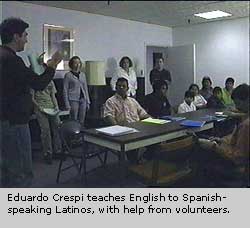| Common
Language Errors Among Spanish Speaking
Students Learning English |
 |
Together
we have five Guatemalan students in our classes. We were disappointed to find
out that none of them spoke any one of the twenty-one Indian languages found
in Guatemala. One of my students said her Spanish actually improved here in
California due to increased interaction with Mexican students and the availability
of media. They all claimed that they spoke Spanish at home here, as well as
at home in Guatemala. We haven't been able to detect any unique differences
between their ESL errors and those of the general Spanish-speaking Latino
population.
Therfore
we have compiled a list of the errors we most commonly witness.
False
Cognates:
There are several words in Spanish that are similar in English, but that have
different meaning. Here are but a few examples:
Actually is similar
to actualmente, but actualmente is better translated as currently.
Realize should not be confused with the Spanish realisar, which generally
translates to give an idea in physical form.
Adjectives as Adverbs: Students often know their
adjectives but the main problem is where to place them in the sentence. In
Spanish you generally place the adjective after the noun. In English it is
the opposite. A simple example: Incorrect: A house beautiful.
Correct: A beautiful house.
Omission of Subject:
This is a very common mistake that Spanish speakers make when learning English.
Unlike Spanish, a subject is always necessary in English.
Example: Incorrect: Is important to get good grades.
Correct: It is important to get good grades.
This v. These: There is first a problem with
pronunciation. Spanish speakers tend to pronounce this and these the same
way. Therefore students frequently use only this in their writing. They do
not seem to realize that there is also a plural form. Examples: Incorrect:
I think that all this problems are related to poverty.
Correct: I think all these problems are related to poverty.
Slang: Many students are unaware of the difference
between formal and informal English. It’s not uncommon to find many of
the following words in formal essays:
*guys
*ain't (combined with another negative)
*gonna
*wanna
*cause
*thru
*Do you feel
me?
Overgeneralization: Overgeneralization of the
rules is another common mistake that students make in their reading and writing.
An example is the use of commas in writing. Example: "My mother, and
I got in the car, and then went to the mall."
Pronunciation:
Many students have consistent pronuciation problems
related to their L1 (Spanish). 'i' is most often pronounced as a long 'e'.
Students also have a hard time pronouncing the final 'ed-' and some words
that have 'th'.
